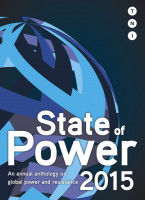Political Capture by the Financial Industry
Topics
How did the financial sector succeed escaping censure and even effective regulation despite the global economic crisis? Through the case study of the proposed Financial Transaction Tax, Kalaitzake looks at how the financial sector succeeded in capturing policy and politicians and how we might challenge their power.

Authors
Since the 2007 outbreak of the financial crisis the visible political dominance of the financial industry has become an issue of major concern for civil society. This essay unpacks the precise sources and diverse mechanisms of financial political power within the contemporary global economy. It illustrates this power over the policy-making process with specific reference to the case of the European Financial Transac- tion Tax, a policy which has been pursued by European authorities since 2009. This initiative is currently poised for defeat by the financial industry however, because of extensive watering down of the original proposal. The failure of this policy initiative is not an isolated event but indicative of a broader trend of successive political victories for the industry since the crisis.
The paper proceeds first with a brief overview of the political protection of the financial industry since the global economic crash, specifically in the policy-making domain of financial regulation. Second, I provide a brief theoretical overview of the distinct sources of financial political power within the global economy: ‘instrumental’ power involving conscious political mobilisation and direct lobbying; ‘ideological’ power involving a broadly neoliberal policy consensus among elite political groups; and ‘structural’ power involv- ing the threat of capital flight and disinvestment, exacerbated in the context of contemporary ‘financiali- sation’. Third, I illustrate the concrete manifestation of this power, highlighting the case of the European Financial Transaction Tax. I conclude by suggesting that efforts to overcome the economic dominance of the financial sector necessarily depend upon simultaneously curtailing the political influence of financial actors and markets over the policy-making process, and offer some brief suggestions for how this may be achieved.
This essay was published in the State of Power 2015.
Pages: 11
